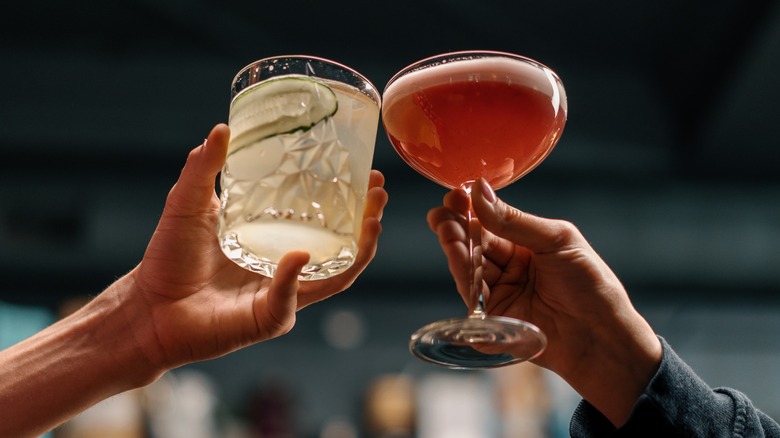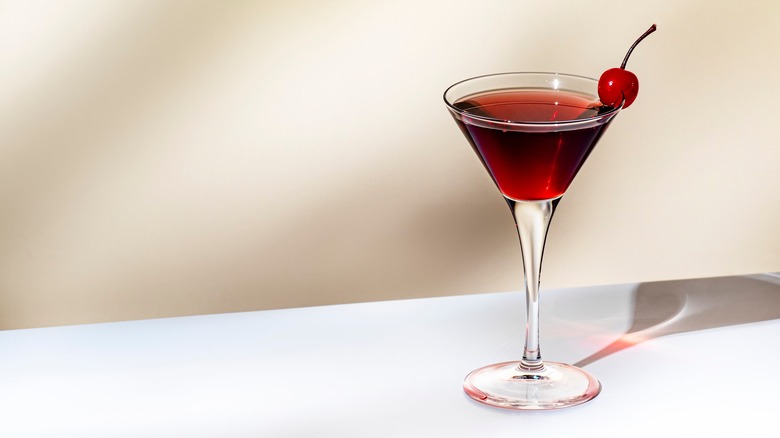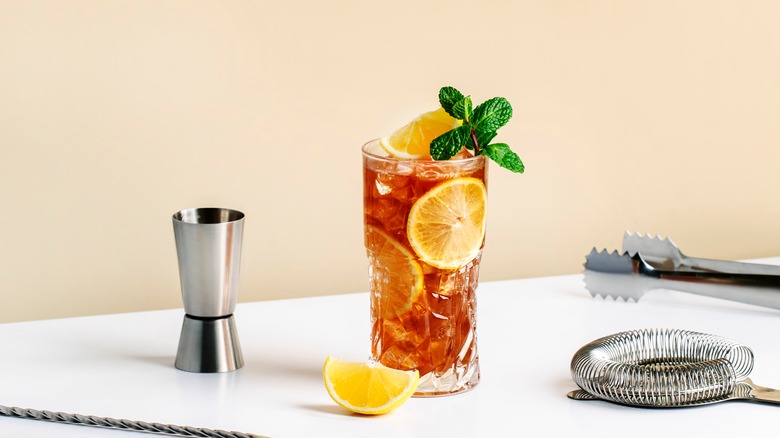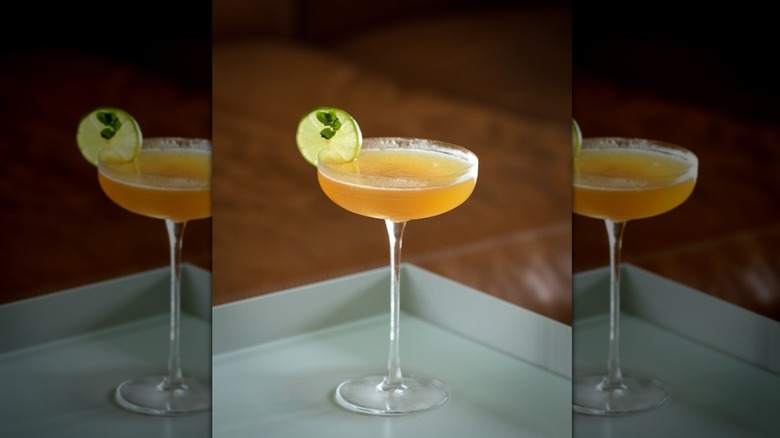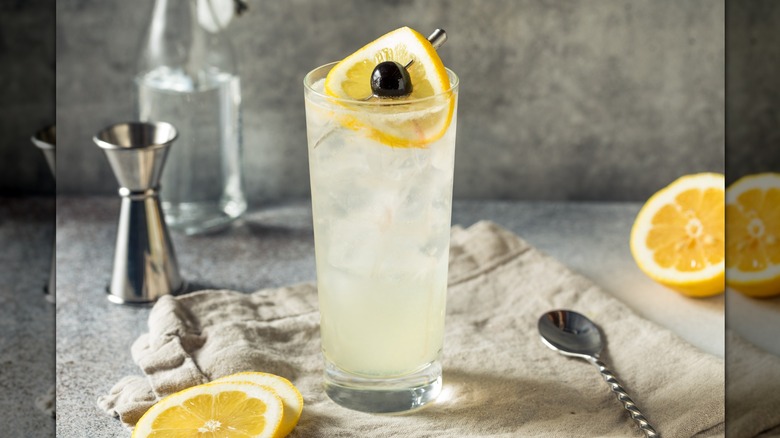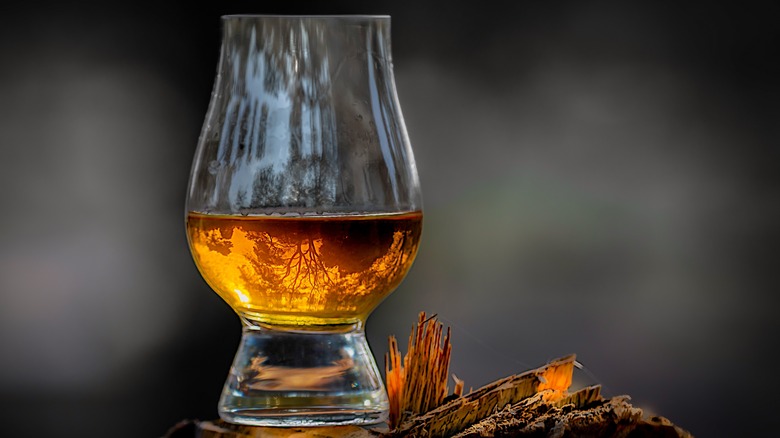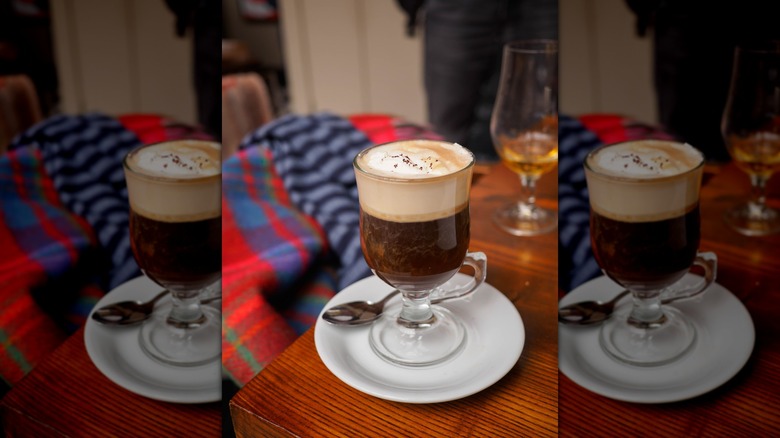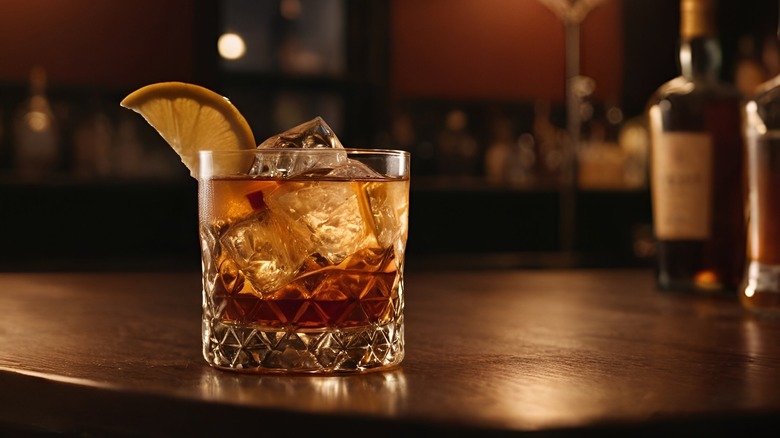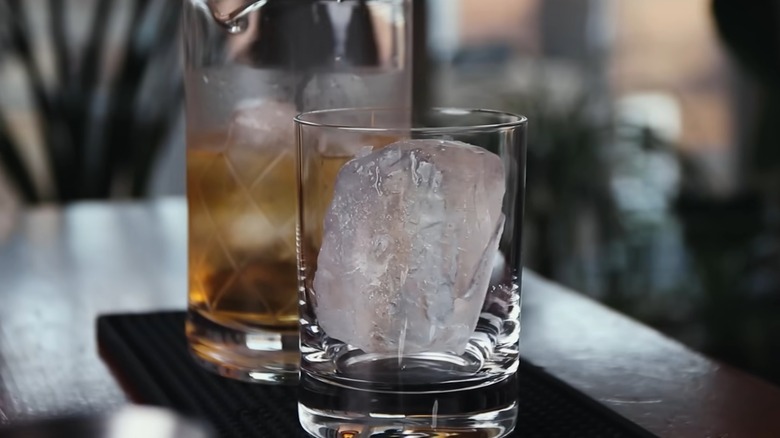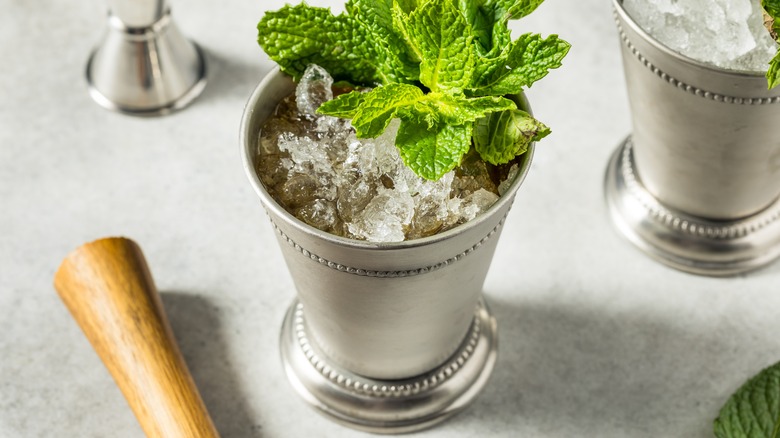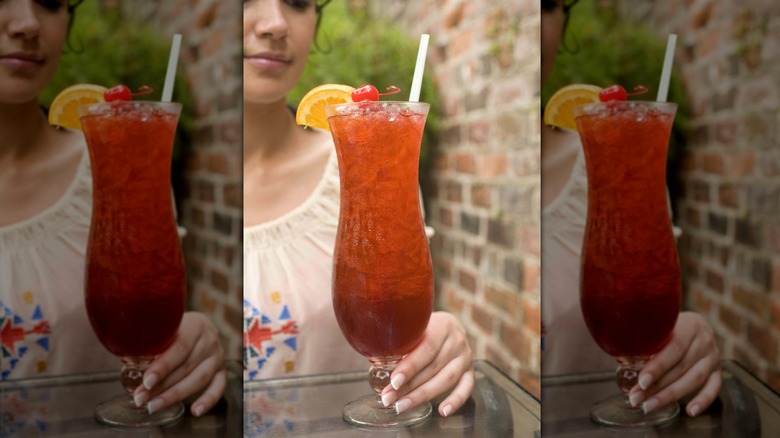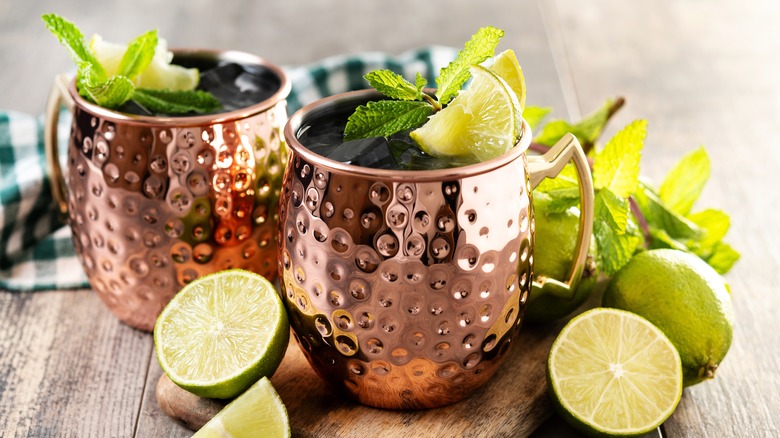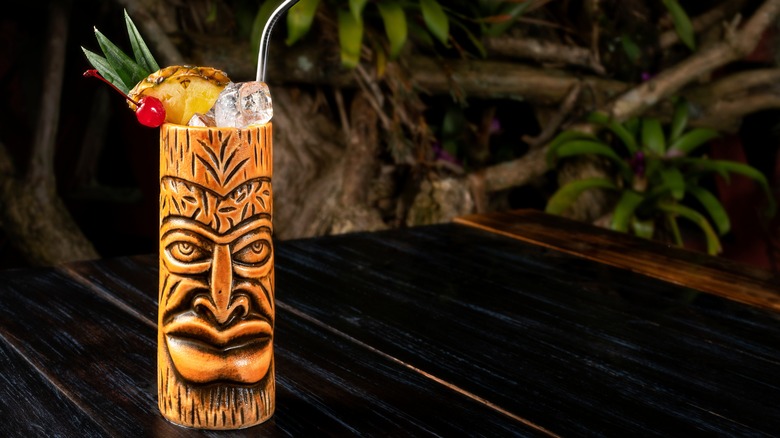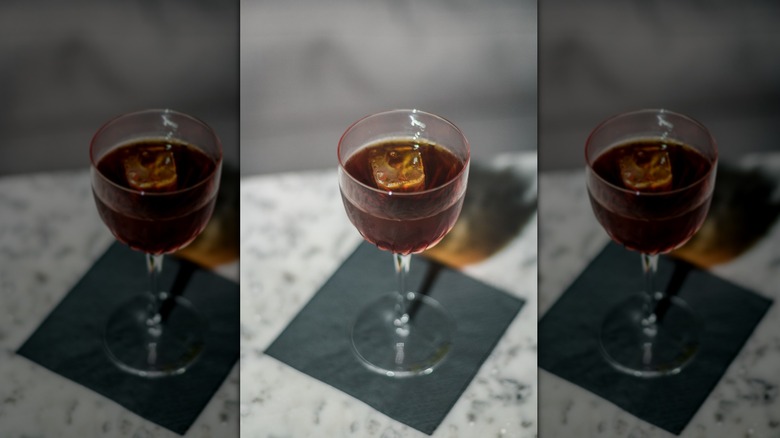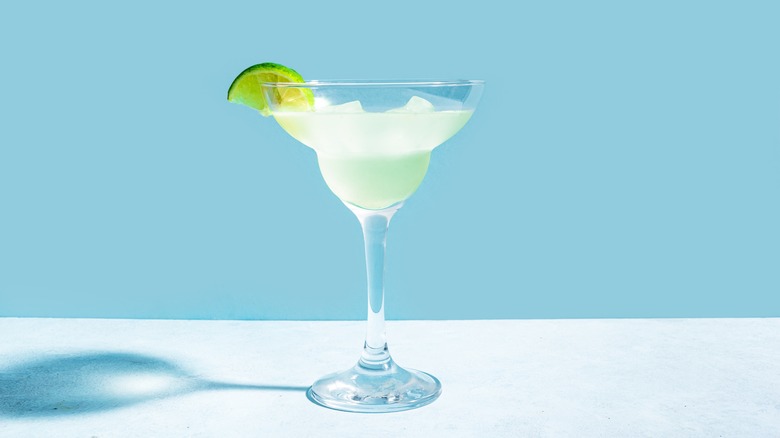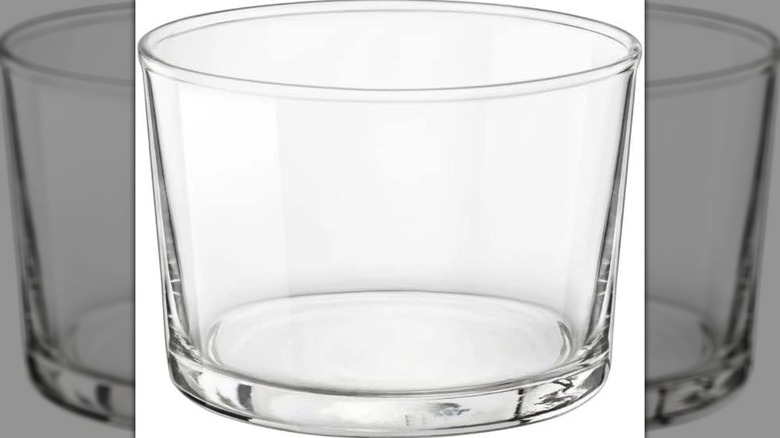Your Go-To Guide To The Different Types Of Cocktail Glasses
We may receive a commission on purchases made from links.
In the United States, craft cocktails have been enjoying a solid spell of popularity. Despite this trend starting during the mid 1980s, the demand for these types of cocktails continues to grow. A report from CGA by NIG and disseminated by The Drinks Business revealed that there was a 6% year-on-year increase in the number of cocktails served by bars and other establishments from 2022 to 2023.
Craft creations define the current cocktail industry and eye-catching presentation has become the industry standard. As a result, glassware now plays a particularly important role. Luckily, bartenders and mixologists have a great deal of glassware to choose from when serving both classic cocktails and new creations. Selecting the right glass is not just a matter of aesthetics. As we'll demonstrate in this article, each glass has its own unique characteristics that makes it suited for serving some types of cocktails but not others.
Martini glass
With its distinctive V-shaped bowl and long, slender stem, the martini glass boasts one of the most recognizable silhouettes in all glassware. Associated with sophistication and elegance, this glass has been enduringly popular ever since it was invented in the early 1900s. However, the glass is not solely used because it looks the part; its design also includes several features that make it well-suited to serving martinis and other classic drinks.
First of all, the long stem provides ample space for the drinker to hold onto the glass without touching the bowl and warming the chilled but iceless martini. The relatively steep-sided nature of the glass is also a sensible choice as this prevents the mixed drink from separating. Finally, the wide opening is designed with gin martinis in mind as the greater surface area allows the spirit to open up, releasing its aromas.
All this being said, there is no doubt that the martini glass' most enduring appeal is how stylish it is. Introducing these vibes into your own home is simple as purchasing glasses like Chouggo's Hand Blown Crystal Martini Glasses.
Highball
The highball is a long, tall glass that has a uniform, narrow diameter. It is named for the group of mixed alcoholic drinks, made with a base spirit and large serving of mixer, that are served in it. Usually, these glasses have a capacity of between 8 and 12 fluid ounces, perfect for serving cocktails made with two ingredients such as the gin and tonic and the scotch and soda. That being said, larger options are available, including these 14 ounce Godinger Highball Drinking Glasses.
This glass is one of several so-called chimney-style glasses that are stemless and have a narrow opening. A stem is not necessary as all the drinks served in a highball are accompanied by ice cubes. Due to the narrow nature of the glass, these ice cubes are often stacked atop one another, reducing their surface area and ensuring that they melt at a slow rate. The narrow opening also helps the drink retain its carbonation for longer. Finally, the simple, stable design also allows bartenders to build highballs in the glass. As a result, the majority of drinks served in a highball glass involve muddling and stirring, not shaking.
Coupe
The coupe is a stemmed glass that is topped with a gently curving bowl. These glasses usually hold between 5 to 7 fluid ounces and were traditionally used to serve Champagne and other chilled drinks. The coupe fell out of favor in Champagne drinking circles after the flute was popularized in the middle of the 20th century. Thanks to its narrow bowl, the flute was much better at retaining the drink's carbonation; the coupe's wide bowl means Champagne and other carbonated drinks soon go flat.
While many people continue to drink Champagne out of coupes thanks to their effortless style, the glass is also used to serve a variety of short, chilled cocktails, including the gimlet, sidecar, and the morbidly named death in the afternoon. Many bartenders prefer to use coupes in place of martini glasses because their steeper sides make it harder for people to spill their drinks. Some also prefer the style of the coupe, a timeless design exemplified by FAWLES crystal coupe glasses.
Collins glass
Put simply, the Collins is a large, slightly wider version of the highball. This chimney-style glass carries all the benefits of the highball but with a greater capacity. This greater capacity means that, while highballs usually contain drinks made of a spirit and one mixer, Collins can hold larger, more complex cocktails. Of course, this includes the glass' eponymous cocktail, the Tom Collins which contains lemon juice, sugar syrup, gin, and soda water. If they are to be served with enough ice, cocktails of this nature must be served in glassware that has a large capacity, such as Gyrut's 16-Ounce Highball Glasses.
Just about every variation on the Tom Collins is served over ice and includes a carbonated element, usually soda water. It's for these reasons that the glass is shaped like it is; as with the highball, a narrow opening preserves the drink's carbonation and also ensures that the ice cubes are stacked atop one another to reduce the rate at which they melt.
Glencairn glass
Whiskey is often called the most complex spirit in the world. This makes it all the more surprising that, until 2001, a glass specifically designed for whiskey drinking had not been released. Fortunately, the Glencairn glass was worth waiting for.
Perhaps the most important aspect of the Glencairn glass is its famous tapered neck which channels the whiskey's aromas towards the drinkers' nose. This is absolutely vital to enjoying the spirit, since your nose is essential to appreciating whiskey. Above this neck is a tapered rim, designed to make the glass easy to drink from while a small bowl, shaped to maximize the whiskey's color, allows ample swirling space. The glass is also stemless as it is thought a gentle warming — provided by the drinker's hands — brings out the spirit's best qualities. Designed with the input of multiple master blenders, it's no wonder the Glencairn Whisky Glass is the perfect glass to drink whiskey from.
While designed with neat whiskey in mind, Glencairn glasses can also be used to serve an array of short, aromatic cocktails, most notably the old fashioned and the sazerac. However, the Glencairn's forte is most definitely straight whiskey.
Irish coffee glass
The Irish coffee, a cocktail which sees hot coffee mixed with sugar and Irish whiskey before being topped with whipped cream, rose to prominence in San Francisco during the middle of the 20th century. At this time, the cocktail was served in a 6-ounce glass made by Libbey's, a much respected glass manufacturer based in Ohio. This beautiful vessel remains the industry standard. It is made with heat-retaining glass that protects customers' fingers and ensures the coffee stays warm. What's more, this glass is completely transparent, allowing customers to see the wonderful contrasting colors as the coffee meets the cream. The glass' chalice-like shape only adds to its aesthetic appeal.
Other variations on the Irish coffee glass now abound, including a Libbey Irish Coffee Mug that features a small handle. Although differing slightly from one another, these glasses all feature a wide opening that makes it easy for those making the drink to pipe the whipped cream on top.
Lowball
The lowball is a short, squat glass with straight sides that usually holds 6 to 8 fluid ounces. Also known as a rocks or old fashioned glass, the lowball is usually used to serve short cocktails, including the old fashioned and Negroni, that are accompanied with large chunks of ice. Usually, these drinks are built in the glass itself and are stirred, not shaken. In the old fashioned's case, the sugar is stirred until it is dissolved and, in some instances, pieces of various fruits are muddled to release their flavors. Thanks to its sturdy and stable design, the lowball can easily deal with this muddling without breaking.
Thanks to the ease of using and cleaning the lowball, this glass is perhaps the most versatile of any mentioned in this article. Aside from cocktails, they can be used to serve neat spirits and various non-alcoholic beverages. Rare is the bar that operates without a few lowballs.
Double rocks glass
The double rocks glass is, as the name suggests, simply a larger version of the rocks or lowball glass. However, it is not quite double the size. While a lowball holds between 6 and 8 fluid ounces, the double rocks glass usually has a capacity of 12 to 14 fluid ounces. Thanks to its size, this glass is often used to serve larger format cocktails, such as the margarita or various tiki cocktails, that might spill if placed in more precarious glassware.
While the double rocks glass gives the bartender more room to work with, those using this type of glass should fight the temptation to brim it with ice. And while adding extra ice is not always the right approach depending on the drink and its sipper, the large size of the double rocks glass does allow bars to get more creative with the type of ice they use. Specifically, it allows them to add large blocks of high-quality, hand-carved ice to cocktails, a clear indicator to customers that this bar takes its work seriously.
Julep cup
Anyone who has been to Kentucky will be more than familiar with the julep cup. This eye-catching metal cup is used to serve the mint julep, the official drink of the Kentucky Derby. Julep cups have been made in the United States since the late 1700s when craftsmen worked silver and pewter into the now classic tapered shape, complete with a fluted rim. In the 20th century, stainless steel julep cups also became common.
Once a drink for the rich, mint juleps, and the cups used to serve them, soon became a status symbol. Today, premium julep cups like these Prince of Scots Mint Julep Cups are often given as gifts and used commemorate special occasions including graduations and birthdays. That being said, the cups are not souvenirs alone and are still well-suited for serving cocktails. One of the most enduring parts of the julep cup's appeal is its aesthetic; when used to serve mint juleps with plenty of ice the metal cup frosts over, giving the drink an incredibly appetizing, and iconic, appearance.
Hurricane glass
The hurricane glass is a tall, curved glass with a short stem that has a pronounced beachy style. The glass was created to serve the hurricane, a rum-based cocktail that may have been created in New Orleans just after the end of World War II. While the exact origins of the cocktail is disputed, there is no doubt that this eye-catching glass was inspired by the hurricane lamp, a piece of curved glass that's used to cover candles.
Generally, hurricane glasses hold a large amount of liquid, around 20 fluid ounces, with some like these JoyJolt Premium Hurricane Cocktail Glasses being even larger. Unsurprisingly, hurricane glasses are used to serve large format tiki cocktails like the piña colada and zombie.
Aside from looking appealing, the curves on this glass do not serve any purpose. However, the glass' long, thin body means it shows the interplay of different colored ingredients well, making it a firm favorite of bars that serve colorful tropical cocktails. As an added bonus, the flared rim means the glass can easily support garnishes, including pineapple fronds and cocktail umbrellas.
Moscow mule cup
The Moscow mule came to prominence as the cocktail that convinced Americans to drink vodka. John G. Martin, a marketing specialist who headed up the firm that purchased Smirnoff in 1939, was the one responsible for the cocktail's sudden rise. In order to make the new cocktail stand out, Martin partnered with a businesswoman who owned a company that made copper products and insisted that all Moscow mules be served in eye-catching copper mugs. The Moscow mule cup soon became an integral part of the drink and is still used to serve the cocktail to this day. It has also made the cocktail something of an icon with other Moscow mule flavored products, including potato chips, reaching the market.
The one great benefit of using copper mugs to serve this iced cocktail is that it helps keep it cold. The metal is very thermally conductive, meaning the cocktail remains much colder for much longer than it would if served in a regular glass. What's more, the use of the copper Moscow mule cup has, by now, transitioned from a marketing ploy to a tradition. As such, we expect it to still be served in this drinkware for many years to come.
Tiki mug
Tiki mugs are an essential part of tiki themed bars, a style that was invented by Donn Beach in 1933. Taking inspiration from a variety of Polynesian and Asian cultures, tiki boomed in popularity during the 1950s and 1960s thanks to the likes of Victor Jules Bergeron and his tiki chain, Trader Vic's. It is here that tiki mugs, large ceramic vessels created with a likeness to various Polynesian religious idols and artifacts were first popularized. Since this time, tiki mugs have become collectors items and several companies continue to thrive by making custom tiki mugs.
The main reason for using tiki mugs is aesthetics with products like Viski Hand Painted Ceramic Tiki Glasses being extremely eye-catching. As a rule, the mugs are highly decorative and often come in bright colors. While they are available in all shapes and sizes, the majority of tiki mugs have a traditional cylindrical shape and are large when compared to other glassware. This large size means they can easily support the array of garnishes that often accompany tiki drinks. As an added bonus, the thick ceramic walls of these vessels insulate the drinks, keeping them cooler for longer.
Nick and Nora glass
The Nick and Nora glass is a petite, stemmed glass with a small, steep sided bowl that is used to serve straight up cocktails. This design means that the drink's aromas are more pronounced than when it is served in a more open glass, such as a martini glass, The steep sides also mean that clumsy customers are less likely to spill their drink.
Holding just 5 fluid ounces, this glass is one of the smallest glasses used in cocktail bars. This small size is actually one of the reasons the glass became popular at the beginning of the craft cocktail revolution, in conjunction with the signal that appreciating and savoring your drink was cool no matter its size, rather than just drinking for the sake of drinking.
Popularized by 'The King of Cocktails' Dale DeGroff during the 1980s, the Nick and Nora glass now plays an essential part in just about every cocktail bar and is used to serve everything from martinis to black Manhattans, a play on the classic that replaces vermouth with amaro. Classy design present in products like these handblown Nick and Nora Glasses, all but ensures that the Nick and Nora will remain a favorite of bartenders for decades to come.
Margarita glass
Margarita glasses are easily identifiable by their unique shape which looks somewhat like an upturned sombrero. This unique shape is not only distinctive but practical, too. The margarita glass' peculiar shape means it can hold more liquid than a similarly sized martini glass with some giant margarita glasses, including these Extra Large Margarita Glasses, holding as much as 33 fluid ounces. While this may seem like an excessive amount, demand for extra large cocktails is skyrocketing and many chain restaurants have started serving gargantuan margaritas in recent years.
Regardless of size, margarita glasses always have a wide opening, ensuring that there is a large amount of salted rim — an essential part of every margarita — for the customer to enjoy. They are also stemmed in order to keep the drink cool when it is served straight up. Margaritas that are served on the rocks aren't often served in margarita glasses. Instead, these drinks are served in stemless glasses such as the aforementioned double rocks glass.
Bodega glass
Popular across Europe, the bodega glass is a modest, straight-sided tumbler that is made from thin, tempered glass. These glasses come in several sizes ranging from Bormioli Rocco's 7.5 Ounce Glass Tumblers to its 17 Fluid Ounce Drinking Glasses. Thanks to their simple shape and steep sides, bodega glasses are incredibly versatile and can be used to serve everything from wine to Negronis. The tempered glass also means that bodega glasses are deceptively strong and dishwasher-safe, a win-win for those working in hospitality. As an added bonus, the glasses are also stackable, saving space.
While classy and modest, these glasses are not the best at trapping a drink's aroma. For this reason, they aren't the recommended vessel for serving heavily aromatic drinks, including prestigious wines.
